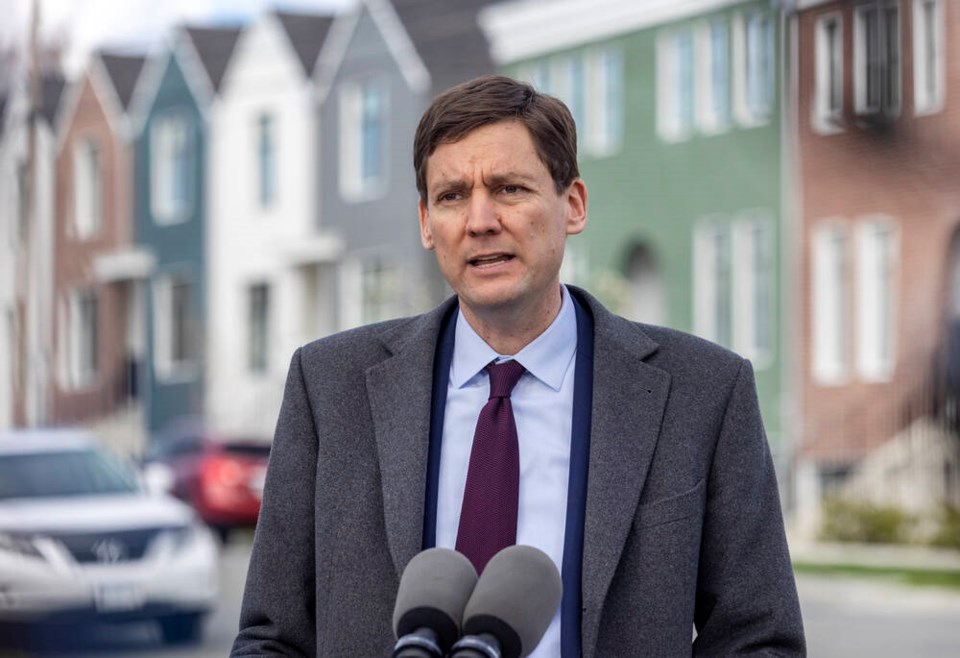Legislation will be introduced in the fall to increase housing in the province, including bringing in a province-wide law to allow up to four units on traditional-sized single-family lots, Premier David Eby announced Monday.
Housing Minister Ravi Kahlon said even more density could be permitted in areas well served by transit. “This means no more long zoning processes just to build a duplex, a triplex or a row home. Without more of these types of homes, we risk pushing more of our next generation out of this province,” he said.
The Homes for People action plan was unveiled Monday at Orca Park in Vic West, against a backdrop of 22 new row townhomes and 12 condos that in 2021 replaced single-family homes in the 200-block of Wilson Street.
The plan starts with a $4-billion investment over three years and commits to $12 billion over a decade with incentives to build, laws to curb speculation, and financial help for renters and homeowners,
“This crisis is touching people in every corner of our province. It’s impacting quality of life in our communities and it’s holding back our entire economy,” Eby said. “Businesses are struggling to attract workers who can’t afford to live in the communities where the jobs are.”
Additional legislation will be introduced this year to allow secondary suites in every community across B.C., the province said.
Next year, homeowners will be able to access a forgivable loan of 50 per cent of the cost of renovations, up to a maximum of $40,000 over five years, if they are willing to rent those secondary suites at below market rate for at least five years.
The move is expected to help homeowners who are struggling to pay their mortgages amid rising interest rates and maintenance costs and who can’t afford to build a suite.
The pilot program is expected to be open to at least 3,000 homeowners for the first three years.
Eby is also promising a flipping tax to discourage speculation.
“We’ll be designing this tax to ensure that it achieves the goal, which is getting away from people buying a home to hold it for a short period of time and sell it for a higher price, driving costs higher,” he said.
“If you are holding a home right now that you intend to flip, if you are thinking about buying a home for the purposes of flipping it, the message today is that this tax is coming — it will cost you money.”
The government is promising to beef up enforcement of short-term rental rules, and streamline and modernize the permit process to cut costs and speed up approvals.
Reducing homelessness is a key part of the plan, with a proposal to add 3,900 supportive housing units and 240 complex-care spaces.
It will include teams that will respond to encampments and support those who are living outdoors.
Eby said ensuring that the rezoning of single-family lots works as intended will require engagement with municipalities.
“We’re going to need to talk to them about what provisions we have in place so this works,” said Eby. “Not whether or not we do it — how does it work?”
The province is providing $50 million to help local governments implement zoning changes for small-scale, multi-unit homes and secondary suites, on top of $1 billion in new infrastructure grants announced in the provincial budget in February.
Victoria Mayor Marianne Alto said the city realizes it’s not just important to build new housing units but new infrastructure to support that housing.
“We’re prepared for that,” Alto said. “It’s part of our decision-making. We will absolutely rely on the partnerships that we have and which we expect to continue and enrich with the province and with the federal government.”
She was “actually quite thrilled” to hear the province being so proactive in creating a number of policies “that will actually encourage municipalities to look very dramatically and think very aggressively at how to create more housing.”
The provincial plan nicely mirrors Victoria’s missing-middle plan passed in January, she said.
“Ours actually is a bit more demanding in the sense that we were looking at the possibility of having up to six units on some lots … within rules and regulations and design regulations that limit that of course,” she said.
Alto said the emphasis on making it easier to have secondary suites, making it easier to have multiple units on single-family lots is a “distinctive change from what started in the 1950s as a focus on single-family dwellings that doesn’t fit the demographic much anymore.”
The province said in a statement that the Homes for People plan will lay the groundwork for faster housing construction and reduced development costs, with less red tape, more incentives and a focus on specific types of housing.
Single-family detached homes are out of reach for many people, and one- or two-bedroom condos often don’t meet the needs of growing families wanting to move out of apartments or needing more room, the province said.
The province noted that 100,000 people moved to B.C. in 2021, and another 150,000 people in 2022, the most in 60 years.
“In the first two quarters of this year, we’re breaking last year’s record which itself was a 60-year high in population growth,” said Eby. “We’re growing gangbusters, and we need our housing supply to keep up with it.”
>>> To comment on this article, write a letter to the editor: [email protected]



